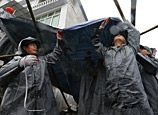
BEIJING, April 26 (Xinhua) -- Chinese authorities have been prudent in cracking down on illegal fund-raising schemes while protecting legitimate public financing and lending activities, an official said Friday.
A primary element defining illegal fund-raising activities is that offenders lack due qualifications while drawing money from members of the public, rather than turning to designated, lawful lenders, as with ordinary private loans, said Liu Wenxi, deputy chief of the economic crime investigation department of the Ministry of Public Security, at a press conference.
The press conference was organized by the Information Office of the State Council to discuss efforts in cracking down on illegal fund-raising activities.
Police have always been very prudent in fighting such crimes, with efforts based on carefully discriminating between legal and illegal activities, Liu said.
They also give equal weight to punishments for related crimes and the protection of lawful development, the official added.
However, Du Jinfu, head of an inter-agency taskforce to lead crackdowns on illegal fund-raising activities, noted that in some cases, civil debtors may become illegal borrowers by later turning to illegal financing channels.
"Some entrepreneurs borrow money from people they know during the start-up phase, but when their businesses expand, they may seek financing from illegal channels, which will be subject to criminal penalties," Du said.
Moreover, unlike ordinary private borrowers, those illegally raising funds usually issue advertisements to promote their projects and promise lucrative returns to attract others, Du said.
To protect the rights and interests of depositors, China has strict admittance standards and regulations for, as well as supervision over, the operations of financial institutions that are lawfully qualified to take deposits. The illegal collection of funds from the public by unqualified entities is explicitly prohibited by law, Du said.
A judicial interpretation on relevant issues was promulgated in 2011, according to Miao Youshui, a senior criminal tribunal judge of the Supreme People's Court (SPC).
The document explicitly defines elements to determine crimes and punishments related to fund-raising, the judge said.
Last year, the SPC overrode the death penalty for Wu Ying, a businesswoman convicted of cheating investors out of several hundred million yuan in a fraudulent and illegal fund-raising scheme.
Following a retrial, a local court sentenced the 31-year-old businesswoman to death with a two-year reprieve.
Her initial death sentence sparked heated debate among the public over China's financing and fund-raising systems. It also prompted calls for the prudent use of capital punishment.


















![]()
